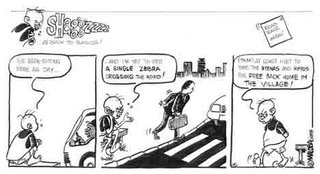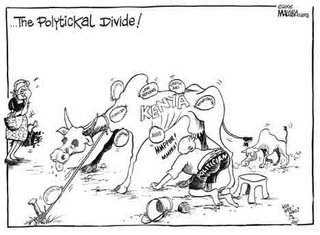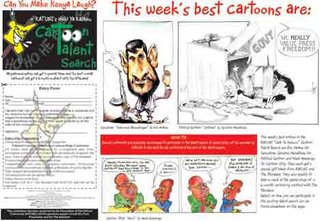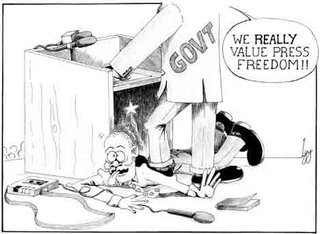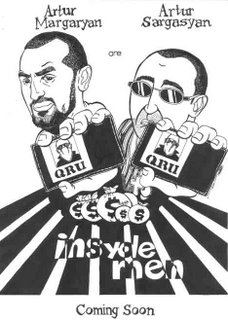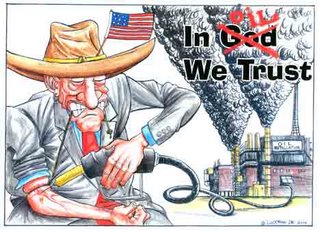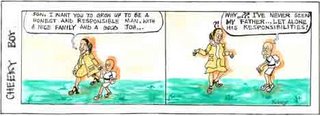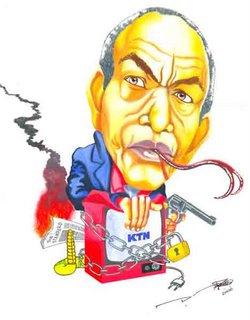A Yemeni court has sentenced Kamal Ali Al-Aalafi, Editor-in-Chief of Al-Rai Al-Aam weekly, to one year in jail and shut down his newspaper for republishing the Prophet Mohammed cartoons, which were first published by a Danish newspaper, thus arousing tensions and rage among Muslims worldwide.
Under the verdict, Al-Aalafi also is banned from writing for six months. The court justified its verdict against the newspaper and its editor for disgracing the prophet by republishing the cartoons. Read More
In a related development, Yemeni Observer editor-in-chief Mohammed Al-Asaadi has been released after journalists staged a sit-in at the office of the General Attorney on 6th December. The journalists were protesting hid detention following a court verdict against him, which condemned him for republishing some of the Danish cartoons, and ordered him to pay a fine of YR500,000 to the states fund. Read More
According to the Yemen Mirror, The Yemeni Observer was suspended for three months and Al-Asaadi charged with insulting the Prophet after the paper reprinted three of the controversial drawings, in black and white and reduced size, with large X’s overlaid on each, as part of multiple-page coverage of the controversy. The editors wanted to denounce the cartoons, explain to the mainly foreign readership of the Yemen Observer why they elicited outrage among Muslims, and to show readers exactly what was under protest. At least 14 private lawyers recruited by Sheik Abdul-Majid Zindani, chairman of Islah Shura Council, filed complaints against al-Asaadi and called, at least indirectly, for his execution.
Throughout the Muslim world, a number of publications printed versions of one or more of the cartoons for various reasons: to denounce them, to mobilize protests against them, or to appeal against the violence they spurred. Many of the publications were targeted as a result, becoming easy prey for governments seeking a pretext to retaliate against the press, curry favor with Islamists, and deflect public attention from domestic problems. but nowhere was the reaction as severe as in Yemen.
Worldwide, the Committee to Protect Journalists found that at least nine publications were closed or suspended and 10 journalists were criminally charged in response to the cartoon controversy. Punitive actions, including censorship orders and harassment, were reported in 13 countries including:
Algeria : Two editors criminally charged.
Belarus : One newspaper suspended.
Denmark : Jyllands-Posten threatened with bomb attack.
India : One editor criminally charged.
Jordan : Two editors criminally charged.
Lebanon : Journalists assaulted during demonstration against cartoons.
Malaysia : Two newspapers suspended.
Morocco : Government organizes demonstrations against newspaper.
Russia : Two newspapers closed.
Saudi Arabia : Newspaper suspended.
South Africa : Censorship orders issued against two newspapers.
Syria : Writer criminally charged for commentary.
Yemen : Three newspapers suspended. Four journalists criminally charged.
Except where noted, the actions came in response to publishing versions of one or more of the cartoons.
Under the verdict, Al-Aalafi also is banned from writing for six months. The court justified its verdict against the newspaper and its editor for disgracing the prophet by republishing the cartoons. Read More
In a related development, Yemeni Observer editor-in-chief Mohammed Al-Asaadi has been released after journalists staged a sit-in at the office of the General Attorney on 6th December. The journalists were protesting hid detention following a court verdict against him, which condemned him for republishing some of the Danish cartoons, and ordered him to pay a fine of YR500,000 to the states fund. Read More
According to the Yemen Mirror, The Yemeni Observer was suspended for three months and Al-Asaadi charged with insulting the Prophet after the paper reprinted three of the controversial drawings, in black and white and reduced size, with large X’s overlaid on each, as part of multiple-page coverage of the controversy. The editors wanted to denounce the cartoons, explain to the mainly foreign readership of the Yemen Observer why they elicited outrage among Muslims, and to show readers exactly what was under protest. At least 14 private lawyers recruited by Sheik Abdul-Majid Zindani, chairman of Islah Shura Council, filed complaints against al-Asaadi and called, at least indirectly, for his execution.
Throughout the Muslim world, a number of publications printed versions of one or more of the cartoons for various reasons: to denounce them, to mobilize protests against them, or to appeal against the violence they spurred. Many of the publications were targeted as a result, becoming easy prey for governments seeking a pretext to retaliate against the press, curry favor with Islamists, and deflect public attention from domestic problems. but nowhere was the reaction as severe as in Yemen.
Worldwide, the Committee to Protect Journalists found that at least nine publications were closed or suspended and 10 journalists were criminally charged in response to the cartoon controversy. Punitive actions, including censorship orders and harassment, were reported in 13 countries including:
Algeria : Two editors criminally charged.
Belarus : One newspaper suspended.
Denmark : Jyllands-Posten threatened with bomb attack.
India : One editor criminally charged.
Jordan : Two editors criminally charged.
Lebanon : Journalists assaulted during demonstration against cartoons.
Malaysia : Two newspapers suspended.
Morocco : Government organizes demonstrations against newspaper.
Russia : Two newspapers closed.
Saudi Arabia : Newspaper suspended.
South Africa : Censorship orders issued against two newspapers.
Syria : Writer criminally charged for commentary.
Yemen : Three newspapers suspended. Four journalists criminally charged.
Except where noted, the actions came in response to publishing versions of one or more of the cartoons.









 African Women’s Development and Communication Network(FEMNET) in partnership with the Association of East African Cartoonists (KATUNI) are organising a cartoon exhibition and competition to mark the Nairobi+21 Conference which is to be held in October. FEMNET in partnership with KATUNI aims to promote an appreciation of cartoons as communication tools for awareness creation and generation of debate on gender issues.
African Women’s Development and Communication Network(FEMNET) in partnership with the Association of East African Cartoonists (KATUNI) are organising a cartoon exhibition and competition to mark the Nairobi+21 Conference which is to be held in October. FEMNET in partnership with KATUNI aims to promote an appreciation of cartoons as communication tools for awareness creation and generation of debate on gender issues.














